|
|
|
Sort Order |
|
|
|
Items / Page
|
|
|
|
|
|
|
| Srl | Item |
| 1 |
ID:
130412
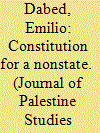

|
|
|
|
|
| Publication |
2014.
|
| Summary/Abstract |
This article sheds new light on the political history of legal-constitutional developments in Palestine in the fourteen years following the Oslo Accord. It examines the relationship between the unfolding social, political, and economic context in which they arose, on the one hand, and PA law-making and legal praxis, on the other. Focusing on the evolution of the Palestinian Basic Law and constitutional regime, the author argues that the "Palestinian constitutional process" was a major "battlefield" for the actors of the Palestinian-Israeli conflict. Thus, changes in the actors' political strategies at various junctures were mirrored in legal-constitutional forms, specifically in the political structure of the PA. In that sense, the constitutional order can be understood as a sort of "metaphoric representation" of Palestinian politics, reflecting, among other things, the colonial nature of the Palestinian context that the Oslo process only rearticulated. This perspective is also essential for understanding the evolution of the Palestinian-Israeli conflict after Oslo.
|
|
|
|
|
|
|
|
|
|
|
|
|
|
|
|
| 2 |
ID:
128311
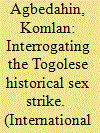

|
|
|
|
|
| Publication |
2014.
|
| Summary/Abstract |
This article, is about an attempt by women in Togo to use a sex strike to end the country's political impasse. The concept dates back to the ancient Greek comedy Lysistrata by Aristophanes, first presented publicly in 411 b.c. More recently, a sex strike had been used with some success in Liberia that inspired Togolese women to attempt this method of non-violent action. The Togolese experiment, however, ended in failure. This article discusses reasons for the failure, including inadequate preparation and miscommunication and the neglect of the political, economic, and social context of Togo.
|
|
|
|
|
|
|
|
|
|
|
|
|
|
|
|
| 3 |
ID:
133108


|
|
|
|
|
| Publication |
2014.
|
| Summary/Abstract |
This special issue of Geopolitics focuses on recent shifts in the geopolitics of agro-food systems linked to debates around a new 'Global Food Crisis' and its implications for (trans)national political agendas. Spurred since 2006 by rising food prices, large-scale farmland acquisitions, and growing public protests, these concerns have motivated new streams of development assistance and reforms to global governance processes, as well as strengthened activism by agrarian social movements. While governments and civil society organisations have struggled with how best to address the realities of worsening food insecurity, the discourse of crisis has simultaneously helped to actively reposition food security as an object of urgent geopolitical calculation and strategy. The stubborn grip of continuing poverty and hunger has prompted many observers to envision a future in which chronic food insecurity and associated political and economic disorder are the new normal.
|
|
|
|
|
|
|
|
|
|
|
|
|
|
|
|
| 4 |
ID:
159438
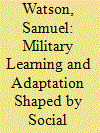

|
|
|
|
|
| Summary/Abstract |
The regular army, rather than citizen-soldiers, drove nineteenth-century U.S. military history (apart from the Civil War). The national standing army was crucial to the defeat of Native Americans, and more important than citizen-soldiers or white pressure on Native American subsistence. Despite new circumstances west of the Mississippi River, the contexts and methods of this warfare did not fundamentally change, and learning (or relearning) and adaptation were crucial to the army’s success. The most important learning was strategic, particularly in lessons of patience, persistence, and control over the initiation and conduct of warfare, and responded to external, non-military contexts (the tug of war between citizen land hunger and tax aversion). Army learning and adaptation did not win these wars by itself, but it facilitated the effective and successful use of force at a cost the nation was willing to pay, and reduced the incidence of large-scale atrocity in comparison with operations by citizen-soldiers.
|
|
|
|
|
|
|
|
|
|
|
|
|
|
|
|
| 5 |
ID:
130413
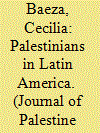

|
|
|
|
|
| Publication |
2014.
|
| Summary/Abstract |
Latin America is host to an estimated half-million people of Palestinian descent, the largest such population outside the Arab world. Migration to the region began in the late 1800s and peaked between 1900 and 1930, with surges around periods of war or economic crisis in Palestine. Predominantly the descendants of a pre-Nakba generation, mostly middle to upper-class Christians who are well-represented among political and business elites, Palestinians in Latin America do not easily fit into a national narrative shaped by the refugee experience. They have therefore held little interest for Palestinian historiography as they did not meet the criteria of "Palestinian-ness" as defined by a nationalist discourse centered on dispossession, denial, and statelessness. With a special focus on Chile,1 this article presents a historical overview of the Palestinian émigré community in Latin America, shedding light on its diverse and dynamic identity politics.
|
|
|
|
|
|
|
|
|
|
|
|
|
|
|
|
| 6 |
ID:
132213
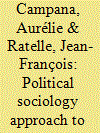

|
|
|
|
|
| Publication |
2014.
|
| Summary/Abstract |
This article seeks to foster a better understanding of the diffusion of conflict in the North Caucasus. We argue that diffusion of conflict is a dynamic and adaptive process in which outcomes are shaped by the intersection of three social mechanisms-attribution of similarity, brokerage, and outbidding-and the political, social, and religious contexts. We suggest that a distinction should be made between horizontal and vertical processes of diffusion. We also approach the empirical diffusion of conflict from a different perspective, showing that non-Chechen actors have played a key role in both the diffusion process and its outcomes.
|
|
|
|
|
|
|
|
|
|
|
|
|
|
|
|
| 7 |
ID:
126647


|
|
|
|
|
| Publication |
2013.
|
| Summary/Abstract |
The recruitment of the all-female Rani of Jhansi Regiment of the Indian National Army in Japanese-controlled Singapore and Malaya, with a particular focus on the period between the first female guard of honour on 12 July 1943 through to the opening of the regiment's main camp in Singapore on 22 October 1943, has to date been insufficiently studied. Starting with the conception of the Regiment in an Axis submarine by the Indian nationalist leader Subhas Chandra Bose (1897-1945), this paper examines the ideas and figures that inspired the regiment and the role of Bose and Dr Lakshmi Swaminadhan (1914-2012) in mobilizing recruits. A division of labour can be distinguished, whereby Bose's rallies and speeches awakened a desire and commitment to join the regiment, whereas Dr Lakshmi used a door-to-door approach and access to homes to convince parents and to confirm participation. By 22 October 1943, 156 women and girls from among the Indian communities in Singapore and Malaya from a wide range of ethnic, social, religious and language backgrounds had joined the regiment that was part of Bose's plan to liberate India from British domination. Among the key sources used in this paper are Dr Lakshmi's late-1960s autobiography and the 2007 autobiographical account of one of her then 16-year-old recruits, Rasammah Naomi Navarednam (b 1927).
|
|
|
|
|
|
|
|
|
|
|
|
|
|
|
|
| 8 |
ID:
153162


|
|
|
|
|
| Summary/Abstract |
Perhaps the central question in the field of counterintelligence is: what drives a spy? Intelligence services are routinely trying to identify individuals who may be susceptible to recruitment. This interest has inspired several studies regarding the motivation of spies. The bulk of this research has been concerned primarily with more or less “pathological” psychological traits, for example, pursuit of easy money and/or a desire for revenge, often fueled by character flaws that emerge under stress. While highly successful in identifying psychological markers, previous research has largely ignored the potential role of social factors.
|
|
|
|
|
|
|
|
|
|
|
|
|
|
|
|
| 9 |
ID:
101201
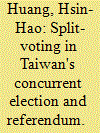

|
|
|
|
|
| Publication |
2010.
|
| Summary/Abstract |
Exploring the issue of referendum voting has become an important aid to understanding the development of democracy in Taiwan. Three referendums on six issues have been held since 2004, and each of them has been held in conjunction with a nationwide election. This paper uses the approach of straight/split-ticket voting to explore Taiwan's referendum voting behavior. Through a case study of the 2008 presidential election,this paper draws ecological inferences from aggregate data and examines the effects of different social contexts on split voting by KMT and DPP voters. By using Wakefield's hierarchical method, it is shown that whether Taiwanese voters picked up referendum ballots in 2008 depended mostly on which party they voted for in the presidential election. This finding indicates that partisanship remained influential in referendum voting of Taiwan. However, social context also matters from the viewpoint of information transmission. This paper examines split-voting behavior by region and addresses different contextual measurements of the political support,economic development, and ethnic cohesion as exploratory factors. By using aggregate data to probe local opinion, this paper provides an alternative approach to explaining voting behavior by regional difference.
|
|
|
|
|
|
|
|
|
|
|
|
|
|
|
|
| 10 |
ID:
181745


|
|
|
|
|
| Summary/Abstract |
In this study we examine how grievances and social connection among Somali immigrants are associated with attitudes towards radicalization to violence. Data was drawn from structured interviews with 213 Somali young adult men living in North America. Structural Equation Modeling was used to test the association of grievances with attitudes in support of political violence, and the mediating role of social connection (ethnic community belonging, attachment to nation of residence, and social comfort seeking online). Both grievances and social connection/disconnection relate to support for political violence, but in complex ways. Findings are discussed in relation to prevention of violent extremism.
|
|
|
|
|
|
|
|
|
|
|
|
|
|
|
|
| 11 |
ID:
132310
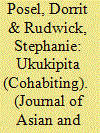

|
|
|
|
|
| Publication |
2014.
|
| Summary/Abstract |
In South Africa non-marital cohabitation rates among Africans remain low, and particularly in the context of very low marriage rates. Through qualitative interviews with urban isiZulu-speakers we explore attitudes towards ukukipita (cohabiting) in contemporary Zulu society. These in-depth interviews capture the meanings associated with non-marital cohabitation and they provide insights into why cohabitation is widely viewed as unacceptable in Zulu society unless the man has initiated ilobolo (bridewealth) negotiations and concrete marriage plans are in place. Cohabitation without ilobolo payment is widely interpreted as akin to behaving disrespectfully towards Zulu culture and tradition, the immediate family and the Zulu community more broadly.
|
|
|
|
|
|
|
|
|
|
|
|
|
|
|
|
|
|
|
|
|